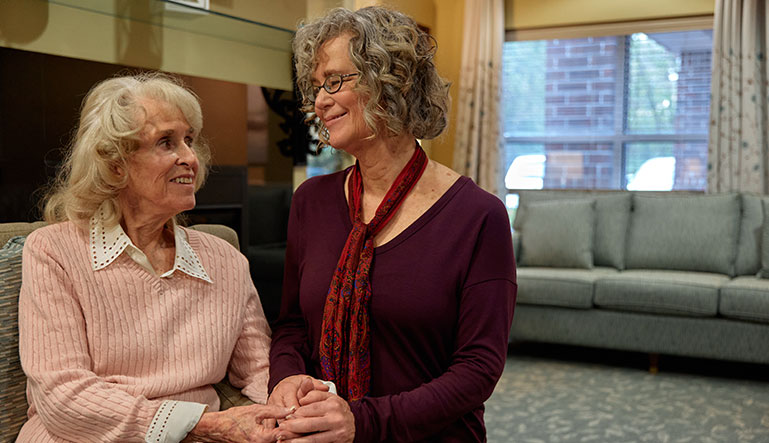What can you do when a parent’s health is declining, but they won’t accept help? It’s especially concerning when the senior lives alone and is trying to maintain their home. The situation is surprisingly common. For families, it’s frustrating and worrisome.
Researchers at Penn State University conducted a study that explored this very issue. They found that nearly 80 percent of adult children acting as a caregiver for a parent (or parents) described their loved one as “stubborn.” Family caregivers struggle with concerns ranging from unsafe driving to annual physicals.
One commonly contentious topic is what to do when an aging parent’s home is no longer safe for them to live in, especially alone. They may have mobility issues, for example, that an older house can’t accommodate. In addition to reducing the risk for a disabling fall, moving to an assisted living community can improve nutrition and reduce isolation. But older adults sometimes refuse to even consider it until a crisis occurs.
Whatever the challenge, it can lead to friction between family members. If your family is having a tough time agreeing on what to do next, there are steps you can take to improve communication.
3 Tips for Productive Communication about Senior Care
- Open-ended questions are best: You won’t be able to move forward until you get to the root of your loved one’s hesitation. Are they resistant to selling their house because they raised a family there? Or maybe they dread having to get rid of some belongings. Even when an older adult feels unsafe in their home, emotional attachments may keep them from making a change.
- Instead of doing most of the talking, ask open-ended questions that encourage the elder to explain their feelings and fears. Be patient and let them talk without interrupting or trying to tell them how to feel. It’s essential to understand what’s behind the barriers they are putting up.
- Kindness and empathy matter: For a proud senior who has always been independent, accepting help or moving from their home can be emotionally devastating. Acknowledge how tough these changes are. Kind words and an empathetic tone will usually go further than frustration or strong-arm tactics.
It may help to explain that senior care solutions, such as in-home caregivers or assisted living, actually protect independence. By accepting a little help now, an older adult will likely be able to maintain their independence longer.
- Change is a process: Unless you or the senior’s physician suspects they are in immediate danger, accept that this will be a process. This is rarely a one-time conversation that leads to big changes immediately.
While you might think they need to move to a condo or an assisted living community right away, meet in the middle. Perhaps they will accept a few hours of home care a day while beginning to watch virtual tours of nearby assisted living communities.
Explore Five Star Senior Living
At Five Star communities, we know change can be difficult. Our experienced team members know how to put a senior at ease and help them see the positive side of moving. Contact us today to learn more!

